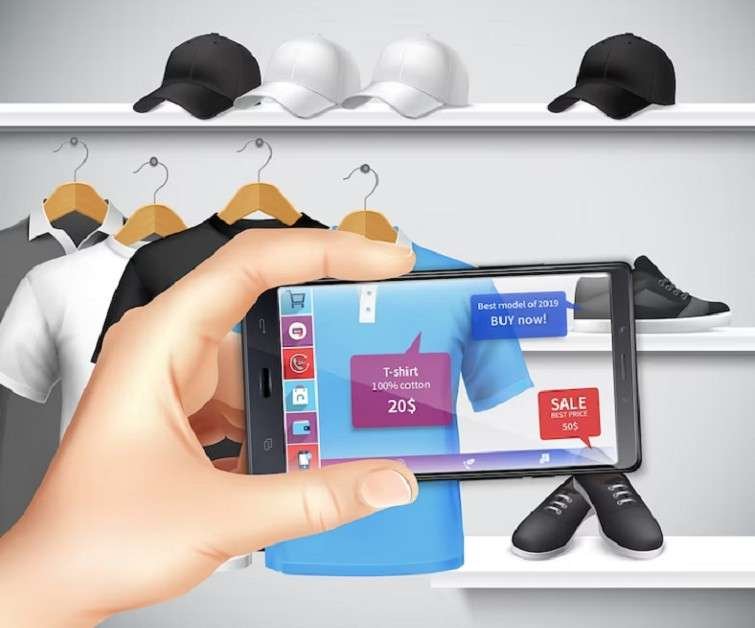Introduction to Retail business:-
Retail business basically means the process of selling goods or services directly to consumers for their personal use or consumption. It is a process in which the retailers purchase the goods from wholesalers and sales to the customer/consumer.
Retailers play an important role in the distribution chain which basically means connecting producers or manufacturers to end consumers. Retail businesses include physical stores, departmental stores, supermarkets, etc.
Key components of a Retail Business :
Merchandise selection:-
This Industry has seen an important transformation with the arrival of Augmented Reality ( AR ) technology. With the help of this technology, a major change is seen in the way products are chosen & showcased by the consumer.
Retailers can use and offer immersive & interactive experiences to their consumers and allow them to try the products virtually, visualize them in real-world settings, and gain deeper knowledge about the product or service this latest trend in AR for e-commerce has not only improved customer’s commitment and confidence but also resulted in the reduction of product returns and increased customer satisfaction
Inventory Management:-
Taking advantage of AR in this management, retailers can now put their inventory processes in a particular order, can optimize stock level and ensure timely replenishment.
AR in e-commerce solutions provides retailers with the facility to track and monitor their inventory accurately. Latest trend technology in AR allows retailers to make accurate decisions which reduces situations like overstock or stockouts and improves the overall working ability.
Pricing strategy:-
The strategic decision of pricing the product or service is one of the most essential parts of an e-commerce business. Pricing strategy should be in such a way that it maximizes the profits while remaining attractive to the consumers
Augmented Reality provides valuable support in shaping pricing strategies for retailers some examples of e-commerce pricing strategies are as follows:
- Personalized pricing:-
AR applications mixed with customer data allows retailers to offer personalized pricing based on individual preferences, purchase history, and loyalty.
- Promotional Pricing:-
Promotional pricing strategies can be created by using augmented reality to give organizations interactive and attractive experiences. Retailers can use AR to offer virtual discounts, limited-time offers, or exclusive promotions that encourage customers to make a purchase.
- Dynamic Pricing:-
Augmented reality can provide real-time insights into market demand, customer preferences, and competitor pricing. It helps retailers to identify pricing patterns, trends, and opportunities for price optimization.
Sales and Marketing:-
Wholesalers get involved in marketing activities to promote their products and attract customers. This includes advertising, branding, social media marketing, sales promotions, etc.
Solutions provided to traders by using AR technology allow them to reach audiences all over the world and expand their business beyond geographical boundaries and provide customers with a smooth shopping experience by allowing them to shop from anywhere at any time.
E-commerce Retailing & Omnichannel Retailing:-
The rise of online shopping has transformed the Retail landscape. Many retailers conduct various channels and e-commerce websites to grow their business
Customers can virtually try on clothing and accessories and many more things by visualizing products in their own environment and making a more informed purchasing decision.
Ideas To Promote Your Retail Business Using AR Technology
Augmented Reality App Development helps to promote business on marketing channels such as email marketing, content marketing, social media marketing, etc. While considering a retail business the product or services should be attractive to draw the attention of customers
Businesses can create ad campaigns of AR marketing that help in providing the audience with all the information they need while appealing to them to choose your brand over any other
Giving customers a unique online shopping experience can improve their bond with the organization. Here are some ideas to leverage your business using Ar-Technology:
1) Virtual try-on:-
Implementation of Ar into a business could provide the customer with the facility of virtual try-on with these features. Customers will be able to visualize how products such as clothing, jewelry, and even cosmetics look on themselves before purchasing the product which reduces the hesitation and increases the conversion rate.
customers will be able to overlay virtual representations of the products onto their own image or live video feed by using smartphones or AR-enabled devices. This provides a realistic try-on experience giving customers an accurate representation of how the product would look on them.
AR-based visual try-on enables customers to assess the sizing and fit of products without physically trying them on. clothes and accessories which can be adjusted to match the customer’s body measurements which allows them to see how different sizes & styles would look and fit their own body shape.
Customers can personalize different colors, patterns, or designs based on their choice. And this feature they will be able to check their product or service digitally without any difficulties
2) Interactive Product Catalogs:-
AR technology in businesses could create apps that will allow customers to scan products and get details about the same with its 3d model showcasing the features of the product which gives customers a satisfactory result.
Customers are able to place the product according to their interests and environment using their smartphones or AR-Enabled devices. This feature is specifically used for businesses such as home decorating stores, etc. And by using this feature customers would be able to visualize how a product would fit in its space and will be able to explore different placement options.
Augmented reality could be very useful in the retail industry because they could now provide their customers with the option of audio instruction, animated instructions, and many more. Customers would easily understand the usage of the product and will ease their experience
Businesses provide AR-based catalogs and after using these catalogs customers can view multiple options simultaneously and compare specifications, features, and prices which helps them to make more relevant decisions.
3) Build Brand Awareness:-
Developing Ar application brands can offer interesting games, quizzes and many more. When this activity will be carried out people will come to know about the product or services provided by the business.
AR into your retail business you could offer to attract billboards, print ads, digital campaigns, and many more which help in grabbing customer’s attention and will create a unique identity for your business enterprise
Programs in businesses will be served with several benefits such as. Increasing customer engagement, increasing visibility, delivering personalized experiences, enabling virtual try-ons, facilitating interactive storytelling, and providing valuable data for analysis.
Brand awareness plays an important role in expanding and growing business as it familiarizes your organization with the public as well as customers. It helps in differentiating your brands from various other brands in the market. And creates its own unique identity.
4) Virtual Showrooms:-
Ar technology offers amazing advantages in creating virtual showrooms by providing a dynamic experience for customers. They can view and connect with virtual representations of products allowing them to examine detail and get additional information.
Brands can design virtual spaces that are easy to understand and should build a stronger foundation for better results. This customization adds uniqueness to the showroom experience for customers
Customers can now have an exact idea about how the product would fit them by using augmented reality. Which gives more accurate results and reduces the chances of mismatched purchases.
5) Collaborations & Partnerships:-
Brands should collaborate with industry experts, influencers, and various other famous personalities. The main benefit behind this is to spread awareness about particular brands or businesses.
Complementary brands and retailers have access to a wider range of audiences. Which helps them in expanding their business beyond their existing limit. This partnership opens the door to multiple new market segments and can have better opportunities
Collaboration of two or more brands brings uniqueness to their perspective as well as in resources. This combined knowledge leads to innovative ideas and increases customer engagement
Conclusion
In conclusion, retail businesses can leverage Augmented Reality (AR) in their e-commerce solutions to drive more sales and get better connections with customers. By integrating AR technology retailers can provide interactive product visualizations, virtual try-on experiences, and virtual showrooms allowing customers to engage with products in a more appropriate way. With the growing popularity and advancements in AR technology incorporating AR into e-commerce solutions has become a strategic imperative for retail businesses to stay ahead in the digital landscape and drive sustainable growth.
FAQs
Can AR in e-commerce solutions increase conversion rates?
Yes, AR in e-commerce solutions has shown an increase in conversion rates. By providing customers with a more realistic shopping experience. AR reduces uncertainty and hesitation in online purchases. With the use of this technology, retailers can connect to customers with ease and customers will also be able to connect with the product.
Is AR technology expensive to implement in e-commerce solutions?
The cost of implementing AR technology in e-commerce solutions depends on the complexity and scope of the integration. However, with advancements in technology and the increased availability of AR development tools, the costs have become more accessible for retailers of different sizes. The long-term benefits and potential revenue growth from advancing AR in e-commerce often outweigh the initial investment.
What are the potential challenges of implementing AR in e-commerce solutions?
Implementing AR in e-commerce solutions may present some challenges. Such as the need for technical expertise, ensuring capabilities across devices, and creating high-quality AR content. However, we can overcome these challenges through careful planning, Hiring AR developers, and providing clear instructions and support for customers to maximize the benefits of AR technology.


